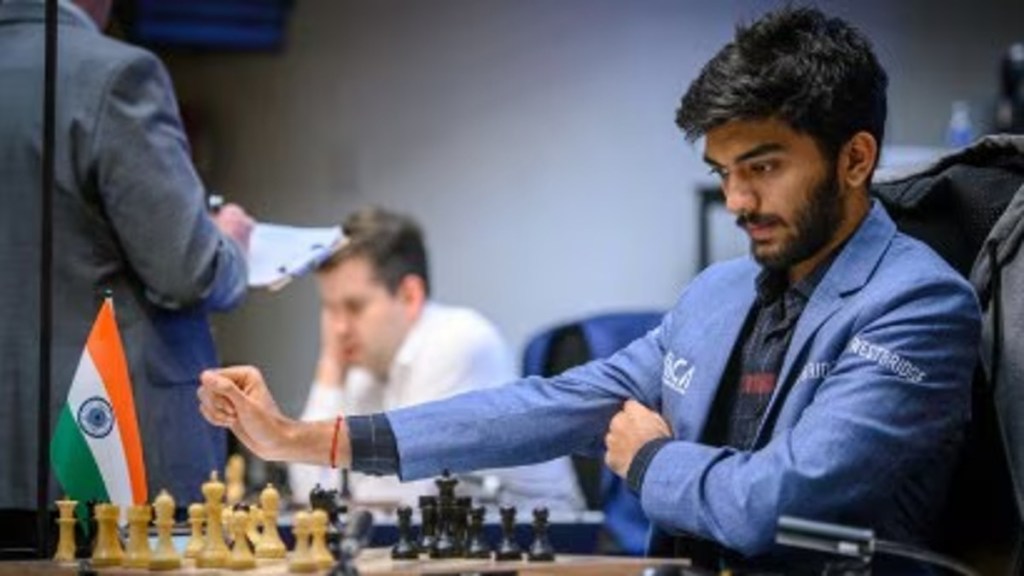Right about the time that 17-year-old D Gukesh made his move to win the prestigious Candidates chess tournament, a video clip of an interview from 2017 went viral. In it, Gukesh, who is not yet a grandmaster, is asked what he wants to become when he grows up. The baby-faced, 11-year-old can hardly contain his smile as he says: “I want to be the youngest world chess champion!”
Seven years since that interview with Chessbase India, Gukesh has bounded up the steps towards becoming the world champion, crossing important markers with breakneck speed that is dizzying even in chess, a sport where every fourth grandmaster is a teenage prodigy.
The boy from Chennai became India’s youngest grandmaster ever at the age of 12 years, seven months, 17 days, missing the tag of the world’s youngest by a mere 17 days in 2019. Last year, he overtook five-time world champion Viswanathan Anand as the country’s top ranked player in FIDE’s monthly published list for the first time after 36 years. Now, he has another feat: becoming the youngest ever Candidates winner, which will also make him the youngest World Chess Championship contender, when he will battle Ding Liren at the World Championship later this year.
Just to contextualise how impressive Gukesh’s feat is, factor in this: the legendary Garry Kasparov was 20 when he won a shot at challenging for the world champion’s crown. Magnus Carlsen and Mikhail Tal were 22. Viswanathan Anand, a man who’s an inspiration and a mentor for the teenager, was 25.
At the high-stakes Candidates tournament, as he chased the title in a field of battle-hardened veterans and first-timers like fellow Chennai teenager Praggnanandhaa and Vidit Gujrathi, the aspect which has stood out the most about Gukesh is how unflappable he remained through high-pressure situations.
One of the most decisive moments for Gukesh came just before the halfway stage of the Candidates, when he was handed a morale-crushing defeat by Alireza Firouzja in Round 7.
Gukesh had held a winning position all through the game, but suddenly found himself in trouble on the clock and erred at the end to lose. Had he won that battle, he would have gone on to become the sole leader in the standings at the halfway point, a definite psychological boost.
“Gukesh just took that defeat in his stride and got on with the next game,” Anand told The Indian Express just before Gukesh’s title was sealed. “I would describe Gukesh at the Candidates as steady and focussed. He appreciates the occasion and the chance he’s got. But he’s steady because he plays one game at a time and gives the impression of keeping his concentration on the game ahead of him. He’s happy and excited at the chance he’s got. But generally, he’s quite level-headed about his tournament situation, which has been very impressive from the beginning. I would say he gives the impression of (being in) control.”
After his Candidates title was confirmed, Gukesh revisited the moment which could have been a banana peel for his chances. While the rest of the world saw him react, and thought that he had missed his shot, there was a tiny voice within him that told him differently.
“If I had to pinpoint when I really felt this could be my moment it was probably after I lost to Firouzja. I was actually quite upset but during the rest day I already felt so good. Even though I just had a painful loss, I was feeling at my absolute best. I don’t know, maybe that loss gave me so much motivation,” said Gukesh.
No Indian has sat on the throne of the world champion since 2013, when Anand lost the crown to Carlsen. A teenager from the land of Anand, who dreamt of being a world champion at the tender age of 10 and carries the air of nonchalance at stressful situations, just might change that and break a handful of more records along the way.


